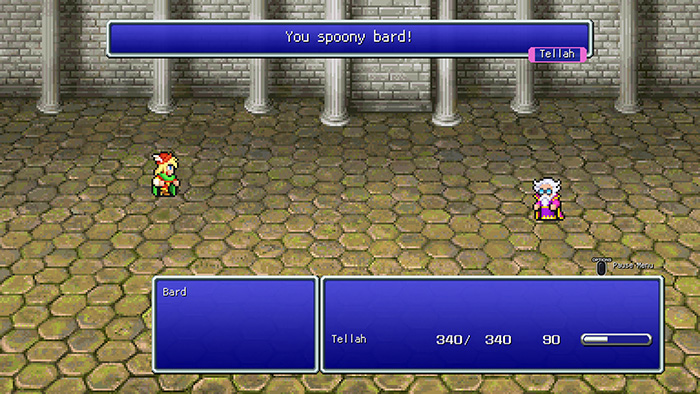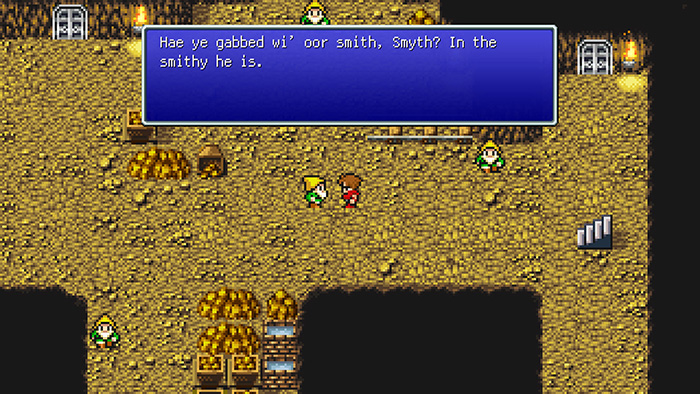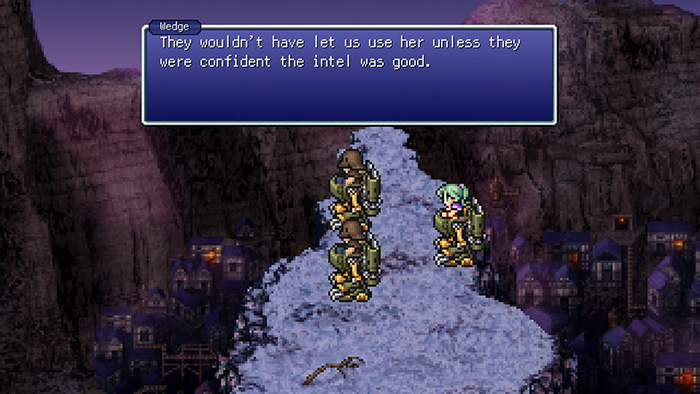FF Topics
![]()
FINAL FANTASY Pixel Remaster
Localization Team Special Interview!
Part 2
The FINAL FANTASY Pixel Remaster series brings all the magic of the first six FINAL FANTASY games to you with quality-of-life upgrades, while staying faithful to the retro design of the original masterpieces! While these titles had all received localizations before, a number of changes were implemented for the pixel remasters. Now that the PlayStation 4 and Nintendo Switch versions are available, we spoke with the titles’ localization team to get some insight into how they approached remastering the localization of these classic FINAL FANTASY games!
In part 2 we dig a little deeper, including why certain dialogue was changed or not, which lines presented a challenge and more! You can also read part one of the FINAL FANTASY Pixel Remaster localization team special interview here.
Interviewees:
- Paula Kaye Gerhold (Lead English Translator)
- Dan Gidion (English Translator)
- Yusuke Haruguchi (Localization Project Manager)
Among these remasters is the first title in the FINAL FANTASY series, now past its 35th anniversary. Obviously that means many people have a strong sense of nostalgia tied to these games – how did that play into the localization team’s approach to this project?
Paula:
The fact that I was able to be the lead translator for a project of such cultural significance was a tremendous responsibility. These six games are incredibly well-known and have such a large and loyal fanbase, I was very conscious of the fact that I needed to live up to everyone’s expectations for this release. My intent was to bring a little bit of an outside perspective into how these games might be received by players who lack the nostalgia of the original fans, as I hadn’t played them as a child. Working with Dan was very rewarding, since we were basically able to look at the games from all angles and use our different experiences with the FINAL FANTASY franchise to determine what to do with the translations for the remaster.
Dan:
The nostalgia factor was always at the forefront of my mind. As someone who grew up playing through the series, and now as a localization translator, these are all games that I would have loved to have worked on back in the day. That made this a very enticing project for me personally, but I also had to make sure my inner fanboy didn’t take the reins. These games mean so much to a great many people that any alteration, big or small, changes the experience from that which players remember so fondly.
When I was working through the text I might see a line and think “that’s not how I’d translate this,” but then I’d remember to keep my ego in check and look at the bigger picture – that I’m not doing this for me, as much as I wish I were. It would have been easy to get carried away and make sweeping changes, or even discard everything and translate from scratch, but to do that would go completely against what the pixel remasters aim to achieve.
Expanding on the previous question, can you give any examples of lines that were purposefully left unchanged from previous localizations?
Paula:
“You spoony bard!” (FFIV)

Dan:
A line like that is the Holy Grail of localization. You just don’t touch it.
Were there any specific titles among the six included in the FINAL FANTASY Pixel Remasters that stand out to you in any way? From a general localization standpoint, or just you personally as a translator on them.
Paula:
I’m extremely partial to FFIII because it had never been translated into English before in this iteration, so having a hand in the first English version of the script for the original FFIII was an amazing experience. Moreso than reworking an existing translation, it’s always nice to get your hands on something you can start from scratch.
Dan:
For me, it’s got to be FFIII as well. The opportunity to work on an original translation for a 30-year-old game of this stature is extremely rare, so it was a privilege to be involved. The 3D remake has been localized before, but rather than reuse that text, the team wanted a new translation for the pixel remasters that stood on its own, which is how this unique chance came about.
Yusuke:
FINAL FANTASY VI stood out to me because we revamped the opera scene. When I first heard about the plan, I was a bit stunned. But in the end, I'm so glad that we got it done. The original vocoder version of the opera is still striking and beautiful in its own way, but the re-recording with live performers (and in seven languages), breathes life into the scene. I remember how moving it was to sit in on the recordings every time. I highly recommend listening to every version, whether you understand the language or not.
Can you tell us about any specific examples of phrases in the pixel remasters that were changed from previous localizations? Please also let us know the reasons for changing those phrases if possible.
Paula:
It’s a rather minor detail, but in the first FINAL FANTASY, the dwarf characters were originally written out with a semi-Scottish accent. That being said, the phonetic way it was written out was hard to follow and not very intuitive for the reader. Luckily, over the years the Localization Division has created guidelines on how to regulate the spellings of written-out dialects in our games, including Scottish accents, so I was able to go back through and tidy up the dwarves’ speech into something closer to what we use in modern scripts. It really was a good opportunity to comb through all the games and just try to make everything a little more unified.

Dan:
I think some players may not have noticed this, but I made a small tweak to the dialogue in the opening scene of FFVI – the one where Biggs and Wedge are stood on the cliffs overlooking Narshe as they discuss their mission, with Terra just behind them. The original line is “They wouldn't have let us use her unless they were confident that the information was good.” and there’s nothing at all bad or incorrect about this. But the more I looked at it, the more “information” didn’t sit quite right with me in context. After much deliberation, I ended up changing it to “intel” for the pixel remasters. It’s a subtle alteration, and the intent is essentially unchanged, but “intel” felt more appropriate to me given that Biggs and Wedge are these highly trained Magitek soldiers on a special mission – they’d probably throw in a bit of military-esque jargon here and there.

I must have stared at this line for an hour or more as I agonized over whether or not the change was justified. In the end I trusted my gut and went with “intel,” and I feel the dialogue is enhanced for it, but plucking up the courage to change part of the opening scene in one of the greatest RPGs of all time took some doing.
When I mentioned making small alterations even when they’re not strictly necessary, this is the level of change I was talking about. I just hope Tom Slattery (the original translator) wouldn’t begrudge me this particular edit!
Are there any lines you translated that you’re especially proud of, or that stand out to you? What about lines that were especially challenging?
Dan:
I’m quite happy with how the scene in the Barrier Tower in FFV came out. During this section, Xezat and Galuf are communicating via whisperweed, which essentially functions like a walkie-talkie, as they work together to scale the tower. As we all know, when you hear someone on the other end of a walkie-talkie, you get those static hisses when the person presses and releases the transmission button. We extended the hissing throughout the dialogue, but only when the speaker isn’t in the shot. For example, when Galuf reaches the top of the tower, he says “Come in, Xezat! We've reached the antenna! Over!” to which Xezat responds “*hiss* Roger that! Over! *hiss*”. In this scene, you’ll see that Galuf’s line has no hissing because he’s on-screen, while Xezat’s is bookended with hisses because he’s on the other end of the whisperweed and not in view. It made my head spin a little bit as I went back and forth between the text and the game trying to figure the whole thing out, but I think we nailed it in the end.

Paula:
I actually really liked writing out the opening intro for FFIII. There’s something fun about writing an introduction to a sweeping epic that conveys the depth and gravity of the game. In the same way, I enjoyed writing out the speech for the Wind Crystal in the beginning scene of FFIII. Maybe I just like gravitas?
If you have a personal favorite amongst the six titles included in the pixel remasters, please share which and what you like about it!
Yusuke:
As I said before (LOL), it's FFVI for me. There are so many interesting characters. And the game has such a range of emotions, from funny scenes like Ultros crashing the opera performance to emotional scenes like the opera itself. That's what I like about it.
Paula:
I personally loved working on and playing through FFIV, simply because the story and characters were so enjoyable. I hadn’t had the opportunity to play it before joining the pixel remaster project, so I got to experience the entire game uninitiated. There are a ton of iconic lines and enemies from IV that appear in other SQUARE ENIX titles, so I had a fantastic time seeing where they originated. The amount of emotion and story packed into that game is also impressive. It’s not a matter of it being a good game “for its time”—FFIV ranks really high on my list of all the games that I’ve ever played, including a lot of modern HD titles.
Dan:
FFVI is the one I really got into growing up. The pacing, especially in the opening hours, is sublime, the music is phenomenal, each character brings a different element to combat, and Shadow is absolutely badass. Oh, and you can suplex a train. You have to be dead inside not to enjoy that.
Lastly, could you please let us hear any words you have for the fans?
Dan:
It was a genuine honor to work on these games, both as a translator and as a fan. I know that there are a lot of memories tied into these classics and people hold them very dear, so I hope players, especially the long-term fans of the series, get what they came for.
Yusuke:
Obviously it is fun when a brand-new game is released, but there's definitely something to be said for older titles getting a new lease of life through remasters. There are all kinds of media out there, but games in particular are always left to the whims of what's most trendy at the time, be it technology or pop culture. But I've always believed that really good works can transcend the time they were made and be beloved by any generation. I hope that the pixel remaster series will be loved by current fans, people who just gave the series a try, and even those future players who will pick up a controller someday.
Paula:
The pixel remasters were a work of love and passion for everyone involved in this project. We hope that the respect we have for the original games, as well as our intention to present them in an updated form came through. With any luck, these games will inspire a new generation of players to look back on the formative years of gaming and bring forth a new wave of much-deserved love for the original FINAL FANTASYs.
Thank you so much for your taking the time to answer our questions!
LOGO & IMAGE ILLUSTRATION:© YOSHITAKA AMANO